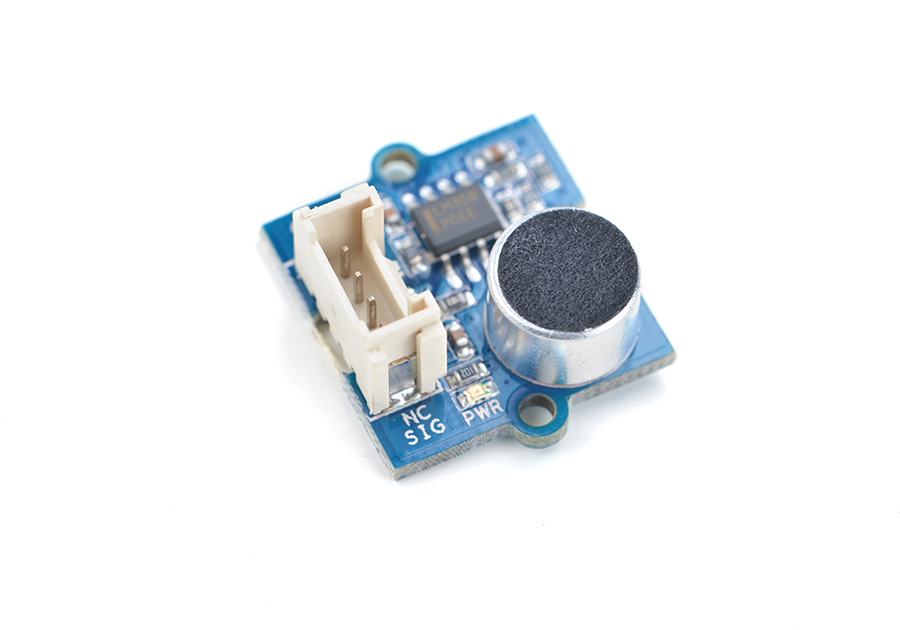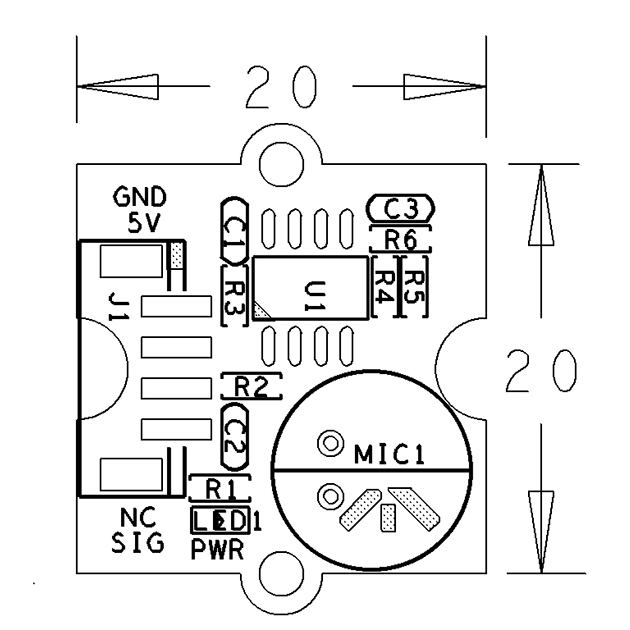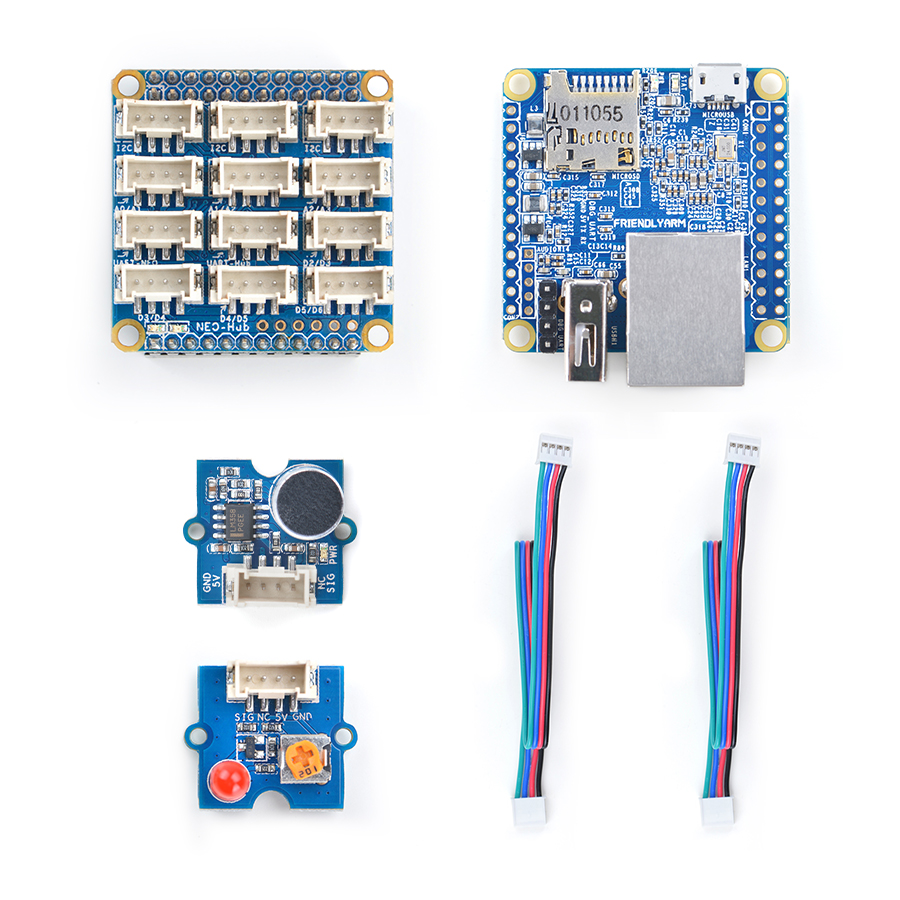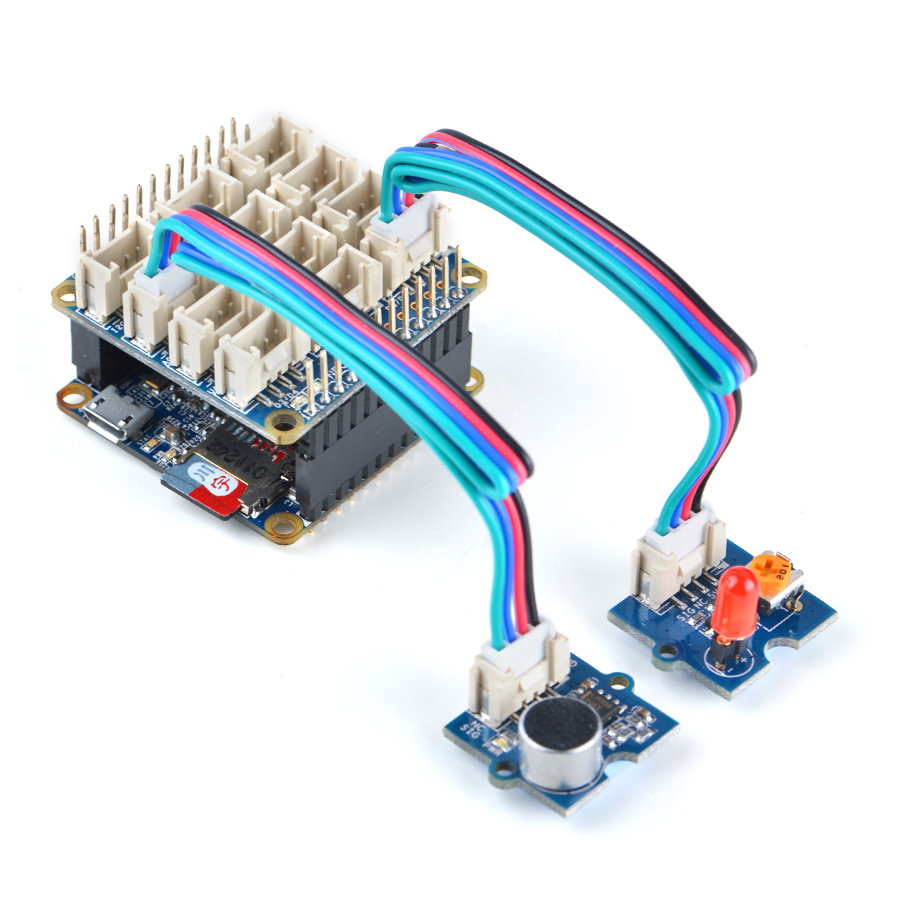Difference between revisions of "BakeBit - Sound Sensor"
From FriendlyELEC WiKi
(Created page with "查看中文") |
|||
| (7 intermediate revisions by the same user not shown) | |||
| Line 1: | Line 1: | ||
[[BakeBit - Sound Sensor/zh|查看中文]] | [[BakeBit - Sound Sensor/zh|查看中文]] | ||
| + | |||
| + | ==Introduction== | ||
| + | [[File:BakeBit - Sound Sensor.jpg|thumb|Sound Sensor]] | ||
| + | * The BakeBit - Sound Sensor is a sound detection module. The module contains an electret condenser microphone. Sound waves impinging on the diaphragm cause the capacitance between it and the back plate to change synchronously, this in turn induces an AC voltage on the back plate, which is amplified with LM358 as output. | ||
| + | * Its default output is high. When it detects a sound wave it will output low. When no sounds are detected it will output high. | ||
| + | |||
| + | ==Hardware Spec== | ||
| + | * Standard 2.0mm 4-Pin BakeBit Interface | ||
| + | [[File:BakeBit - Sound Sensor_PCB.png | frameless|320px|BakeBit - Sound Sensor]] | ||
| + | |||
| + | * Pin Description: | ||
| + | {| class="wikitable" | ||
| + | |- | ||
| + | |Pin || Description | ||
| + | |- | ||
| + | |GND || Ground | ||
| + | |- | ||
| + | |5V || 5V Supply Voltage | ||
| + | |- | ||
| + | |NC || Not Connected | ||
| + | |- | ||
| + | |SIG || Signal | ||
| + | |} | ||
| + | |||
| + | == Code Sample:Sound Sensor == | ||
| + | |||
| + | When this program runs if surrounding environment’s sounds reach a threshold value the LED will be turned on. | ||
| + | |||
| + | === Hardware Setup === | ||
| + | Connect the Sound Sensor module to the NanoHat Hub's A0 and the LED module to the NanoHat Hub's D5: | ||
| + | |||
| + | ::{| class="wikitable" | ||
| + | |- | ||
| + | |[[File:Sound Sensor-1.jpg |frameless|300px]] || [[File:Sound Sensor-2.jpg |frameless|300px]] | ||
| + | |- | ||
| + | |} | ||
| + | |||
| + | === Source Code === | ||
| + | |||
| + | <syntaxhighlight lang="python"> | ||
| + | import time | ||
| + | import bakebit | ||
| + | |||
| + | # Connect the BakeBit Sound Sensor to analog port A0 | ||
| + | # SIG,NC,VCC,GND | ||
| + | sound_sensor = 0 | ||
| + | |||
| + | # Connect the BakeBit LED to digital port D5 | ||
| + | # SIG,NC,VCC,GND | ||
| + | led = 5 | ||
| + | |||
| + | bakebit.pinMode(sound_sensor,"INPUT") | ||
| + | bakebit.pinMode(led,"OUTPUT") | ||
| + | |||
| + | # The threshold to turn the led on 400.00 * 5 / 1024 = 1.95v | ||
| + | threshold_value = 400 | ||
| + | |||
| + | while True: | ||
| + | try: | ||
| + | # Read the sound level | ||
| + | sensor_value = bakebit.analogRead(sound_sensor) | ||
| + | |||
| + | # If loud, illuminate LED, otherwise dim | ||
| + | if sensor_value > threshold_value: | ||
| + | bakebit.digitalWrite(led,1) | ||
| + | else: | ||
| + | bakebit.digitalWrite(led,0) | ||
| + | |||
| + | print("sensor_value = %d" %sensor_value) | ||
| + | time.sleep(.2) | ||
| + | |||
| + | except IOError: | ||
| + | print ("Error") | ||
| + | </syntaxhighlight> | ||
| + | |||
| + | [https://github.com/friendlyarm/BakeBit/blob/master/Software/Python/bakebit_sound_sensor.py Github] | ||
| + | |||
| + | |||
| + | === Run Code Sample === | ||
| + | |||
| + | Before you run the code sample you need to follow the steps in [http://wiki.friendlyarm.com/bakebit bakebit tutorial] to install the BakeBit package.<br /> | ||
| + | Enter the "BakeBit/Software/Python" directory and run the "bakebit_sound_sensor.py" program: | ||
| + | <syntaxhighlight lang="bash"> | ||
| + | cd ~/BakeBit/Software/Python | ||
| + | sudo python bakebit_sound_sensor.py | ||
| + | </syntaxhighlight> | ||
| + | |||
| + | === Observation === | ||
| + | |||
| + | When you make some sounds to the sound sensor and if the sounds are big enough the LED will be turned on. | ||
| + | |||
| + | ==Resources== | ||
| + | *[Schematic]([http://wiki.friendlyarm.com/wiki/images/f/ff/02-SCHEMATIC_Sound_Sensor.pdf BakeBit - Sound Sensor.pdf]) | ||
| + | *[BakeBit Github Project Page](https://github.com/friendlyarm/BakeBit) | ||
| + | *[BakeBit Starter Kit User's Manual](http://wiki.friendlyarm.com/bakebit/bakebit_starter_kit_manual_en.pdf) | ||
| + | |||
| + | ==Update Log== | ||
| + | ===December-14-2016=== | ||
| + | * Released English version | ||
| + | |||
| + | ===Jan-19-2017=== | ||
| + | * Renamed "NEO-Hub" to "NanoHat-Hub" | ||
| + | |||
| + | ===Jan-20-2017=== | ||
| + | * Renamed "NanoHat-Hub" to "NanoHat Hub" | ||
Latest revision as of 08:21, 20 January 2017
Contents
1 Introduction
- The BakeBit - Sound Sensor is a sound detection module. The module contains an electret condenser microphone. Sound waves impinging on the diaphragm cause the capacitance between it and the back plate to change synchronously, this in turn induces an AC voltage on the back plate, which is amplified with LM358 as output.
- Its default output is high. When it detects a sound wave it will output low. When no sounds are detected it will output high.
2 Hardware Spec
- Standard 2.0mm 4-Pin BakeBit Interface
- Pin Description:
| Pin | Description |
| GND | Ground |
| 5V | 5V Supply Voltage |
| NC | Not Connected |
| SIG | Signal |
3 Code Sample:Sound Sensor
When this program runs if surrounding environment’s sounds reach a threshold value the LED will be turned on.
3.1 Hardware Setup
Connect the Sound Sensor module to the NanoHat Hub's A0 and the LED module to the NanoHat Hub's D5:
3.2 Source Code
import time import bakebit # Connect the BakeBit Sound Sensor to analog port A0 # SIG,NC,VCC,GND sound_sensor = 0 # Connect the BakeBit LED to digital port D5 # SIG,NC,VCC,GND led = 5 bakebit.pinMode(sound_sensor,"INPUT") bakebit.pinMode(led,"OUTPUT") # The threshold to turn the led on 400.00 * 5 / 1024 = 1.95v threshold_value = 400 while True: try: # Read the sound level sensor_value = bakebit.analogRead(sound_sensor) # If loud, illuminate LED, otherwise dim if sensor_value > threshold_value: bakebit.digitalWrite(led,1) else: bakebit.digitalWrite(led,0) print("sensor_value = %d" %sensor_value) time.sleep(.2) except IOError: print ("Error")
3.3 Run Code Sample
Before you run the code sample you need to follow the steps in bakebit tutorial to install the BakeBit package.
Enter the "BakeBit/Software/Python" directory and run the "bakebit_sound_sensor.py" program:
cd ~/BakeBit/Software/Python sudo python bakebit_sound_sensor.py
3.4 Observation
When you make some sounds to the sound sensor and if the sounds are big enough the LED will be turned on.
4 Resources
- [Schematic](BakeBit - Sound Sensor.pdf)
- [BakeBit Github Project Page](https://github.com/friendlyarm/BakeBit)
- [BakeBit Starter Kit User's Manual](http://wiki.friendlyarm.com/bakebit/bakebit_starter_kit_manual_en.pdf)
5 Update Log
5.1 December-14-2016
- Released English version
5.2 Jan-19-2017
- Renamed "NEO-Hub" to "NanoHat-Hub"
5.3 Jan-20-2017
- Renamed "NanoHat-Hub" to "NanoHat Hub"



